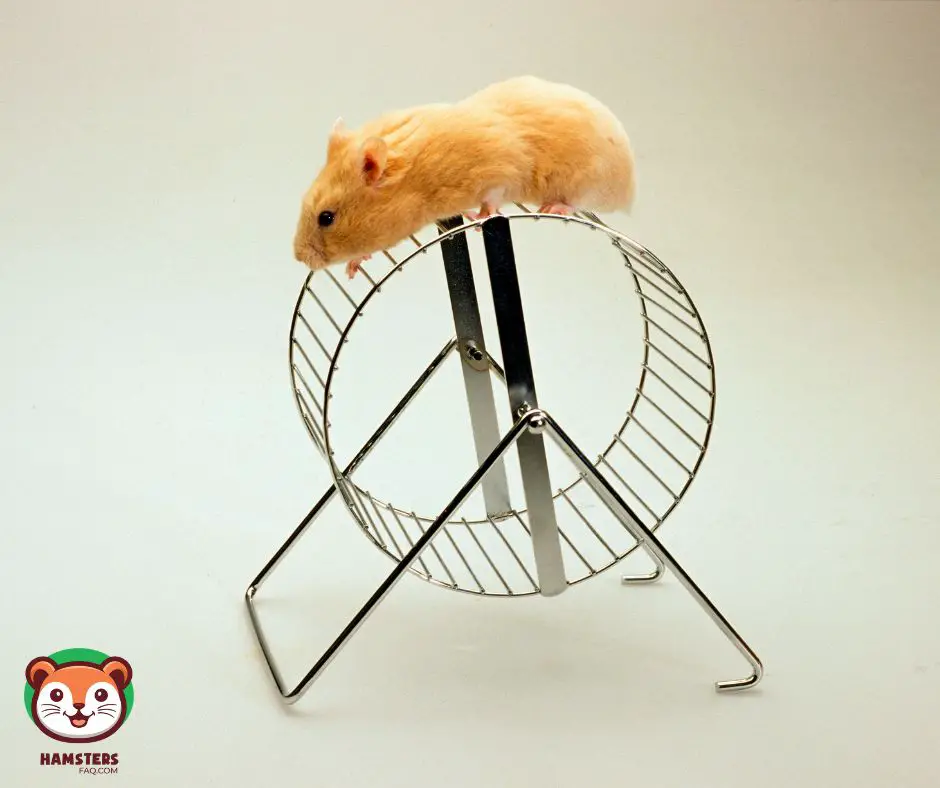Hamsters are one of the most popular pets in the world. They’re small, easy to care for, and loveable. But did you know that hamsters are also incredibly active creatures?
If your hamster isn’t using its running wheel, it could be a sign that there’s something wrong with it.
Well, in this post, we’re going to look at whether hamsters only have a set amount of energy they can use each day or whether they can pace themselves over extended periods. So you will know how long a hamster can run on its wheel.
Hamsters can run on their wheels for between 4 and 6 hours every night. The amount of time they run depends on the type of hamster. Dwarf hamsters will run for less time than Syrian hamsters.
Hamsters need to exercise to stay healthy and happy. Running on a wheel is one way to help them get the necessary exercise. Hamsters also like being petted and held, but if you don’t have time for this, it’s a good idea to let them exercise at least once a day.
It would help if you allowed your hamster to run on its wheel at night so that it doesn’t wake you up when it starts running in the middle of the night.
If your hamster is too small or weak to use a wheel, it may be an excellent idea to get them one anyway. You can place food on top of or inside the wheel as an incentive for your pet to use it regularly.
Can A Hamster Die From Running Too Much?
Hamsters are always on the move and need exercise to stay healthy. However, if you let your hamster run on its wheel all day long, it can become overweight or even die.
Hamsters are very active by nature, so they naturally want to run on their wheels during the day. However, giving them free rein in their cage and letting them run all day can become dangerous.
Hamsters that run all day long tend to become overweight because they don’t get enough rest. Older hamsters can lead to health problems like heart disease or diabetes. In addition, hamsters who are overweight may have difficulty breathing and might not be able to move around as easily as healthy hamsters do.
When hamsters start running too much on their wheels, they also often eat less food than normal because they’re using up so much energy from running around so much that they don’t have enough left over for eating! This is why tracking how long your hamster runs each day is important.
Why Do Hamsters Run On Their Wheel?
1. Natural traits
Hamsters love to run on their wheel. It’s a natural trait, and you’ll find that they run even more if they’re not getting enough exercise in other areas of their lives.
This is also true for ferrets, prairie dogs, and gerbils—similar to hamsters regarding their social needs.
2. It’s fun
Hamsters love to run on their wheels because it is fun.
They do it because they’re bored, and they also do it because it’s great exercise. Running on the wheel is good for hamsters’ health, as it helps them maintain a healthy weight, improves their cardiovascular system, and keeps their bones strong.
Hamsters also get some mental stimulation from running on their wheels too.
3. They are happy
Hamsters also like to run because it makes them feel happy! They get a lot of exercise when they run, which makes them feel good.
And if you watch your hamster closely while running on its wheel, you see that it looks content and happy with itself.
Can a Hamster Live Without A Hamster Wheel?
The short answer is yes, a hamster can live without a hamster wheel. However, better ideas may be for your hamster’s health and well-being.
Hamster wheels are easy to use and can be a fun addition to your pet’s cage. They come in different sizes and styles, so you’ll be able to find one that fits your pet’s needs.
A hamster should not be kept without access to a wheel for more than a few hours at a time, as it can cause stress, anxiety, and boredom, leading to aggression or depression in the hamster. An un-exercised hamster may also develop arthritis and other health issues related to lack of exercise.
Why is My Hamster Not Using its Wheel?
There are many reasons why a hamster may not use its wheel.
1. The cage is too small
Your hamster may be too big to fit inside the wheel. If so, you can purchase a bigger wheel to fit your cage.
2. The wheel is too high off the ground
Hamsters like to run on flat surfaces, so make sure that the bottom of your hamster’s cage is level with the ground or lower than the bottom of their wheel.
This way, your hamster has to work to get around and will want to use it more often.
3. There are other toys in the cage
Hamsters are very curious creatures and always like to explore new things in their environment.
If there are other toys in the cage with them, it could distract them from properly using their wheels.
Remove any other toys from your hamster’s enclosure so they can focus solely on using their wheels when they want to exercise or play.
Conclusion
You may have noticed a lot of variability with hamster wheel running times. The main reason for this is that different types of hamsters can run in significantly different ways.
They can also have very different body weights, exercise routines, and metabolism rates. For example, a young and thin hamster is likely to have a much faster metabolism than an older and larger one.
With this in mind, the best way to answer our question is to break down the results based on these three general factors: the hamster species, the hamster’s age, and weight, and their specific running routine.

